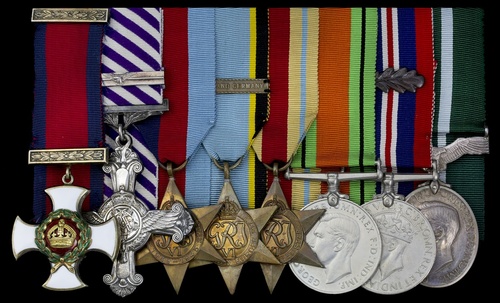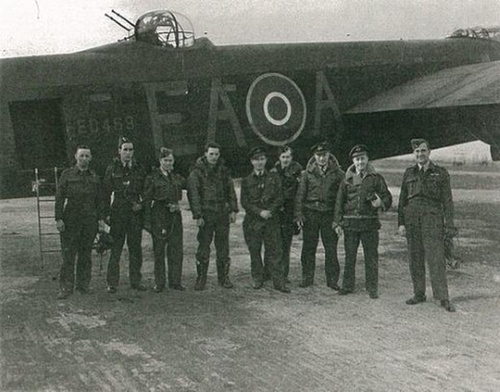Auction: 19001 - Orders, Decorations and Medals
Lot: 581
The outstanding Second World War pathfinder's immediate D.S.O., D.F.C. and Bar group of eight awarded to Wing Commander D. A. Cracknell, Royal Air Force Volunteer Reserve
A three-tour pilot of exceptional ability, he amassed a tally of at least 75 operational sorties, latterly as a highly distinguished Squadron C.O. and Master Bomber in the Path Finder Force
Distinguished Service Order, G.VI.R., silver-gilt and enamel, the reverse of the suspension bar officially dated '1945'; Distinguished Flying Cross, G.VI.R., with Second Award Bar, the reverse of the Cross officially dated '1943' and the reverse of the Bar '1945'; 1939-45 Star; Air Crew Europe Star, clasp, France and Germany; Africa Star; Defence and War Medals 1939-45, M.I.D. oak leaf; Air Efficiency Award, G.VI.R., 1st issue (Act. Wg. Cdr. D. A. Cracknell, R.A.F.V.R.), mounted court-style as worn, generally very fine or better (8)
D.S.O. London Gazette 6 February 1945. The original recommendation - for an immediate award - states:
'Wing Commander Cracknell was Captain of an aircraft detailed to attack Dusseldorf on the night of 2 November 1944. His task was a vital one involving the dropping of target indicators. Long before the target, his aircraft was engaged by most accurate anti-aircraft fire and hit several times, but displaying great coolness and complete disregard of personal safety, this officer made a long and steady bombing run and thus enabled his bomb aimer to achieve the most precise results. The target was well hit as proved by the photograph he obtained.
Even after the bombs had gone and the photograph taken Wing Commander Cracknell's aircraft was still selected as the primary target for the defences and only his great coolness and fine airmanship can have prevented the aircraft from being lost; as it was he returned his damaged aircraft safely to base without further incident.
Wing Commander Cracknell is now carrying out his third tour of operations and has completed a total of 60 bombing attacks regardless of defences and by his fine record of many attacks successfully carried out, together with the thoroughness of his preparation for these attacks, he sets a fine example to the Squadron. In recognition of this officer's fine record of service, I strongly recommend him for the award of the Distinguished Service Order.'
D.F.C. London Gazette 14 May 1943. The original recommendation states:
'Since completing his first tour of operational duties, this officer has participated in a further 14 sorties. While in the Middle East, he completed a number of attacks on Greek and Italian objectives. All his allotted tasks have been performed in a most skilful and exemplary manner. Squadron Leader Cracknell has displayed a marked determination to finish successfully any duty he may undertake. On more than one occasion, engine trouble has failed to prevent him from completing his mission and once when attacking Turin one engine failed before he had crossed the Alps. In spite of this, he continued, bombed the target, and flew the aircraft safely to base. Undeterred by fighter attacks and ground defences this officer has displayed the highest courage and devotion to duty.'
Bar to D.F.C. London Gazette 23 October 1945. The original recommendation states:
'Wing Commander Cracknell has now completed 75 sorties and has commanded a very successful Pathfinder Squadron since the early days of January 1945. He has carried out in an exemplary manner, on 18 occasions, the duties of Master Bomber. His overriding confidence, calmness, determination and coolness of judgment have not only made him an outstanding Captain of aircraft, but also a Squadron Commander second to none.
The results of his squadron can be attributed in no small measure to his excellence as a pilot and Captain in the air and to his discipline and organisation on the ground. I very strongly recommend that this officer's contribution to the final defeat of Germany should be recognised by the non-immediate award of a first Bar to the Distinguished Flying Cross.'
Douglas Aubrey Cracknell was born in London on 9 December 1909 and gained a private pilot's certificate at the South Coast Flying Club, Shoreham in December 1935. By profession an architect, he nonetheless commenced commercial flying in 1936, undertaking work for the Railway Air Services, in addition to running private charters; he was also a flying instructor with Airports Ltd.
A pre-war member of the Royal Air Force Volunteer Reserve, Cracknell was called-up on the renewal of hostilities and confirmed in the rank of Pilot Officer in March 1940. What ensued - even by exacting wartime standards - was an exceptional operational career.
First and Second Operational Tours - 148 and 49 Squadrons - D.F.C.
He first went operational as a pilot in No. 148 Squadron in the Middle East, the unit having been reformed in Malta in December 1940. Equipped with Wellingtons, it carried out strikes against a variety of targets, in Cracknell's case against Greek and Italian objectives on at least 24 occasions.
Tour expired, he was ordered back to the U.K. in 1942 and, in October of the same year, resumed his operational career with a posting to No. 49 Squadron, a Lancaster unit operating out of R.A.F. Scampton - and afterwards R.A.F. Fiskerton. As confirmed by subsequent information supplied at the time of the recommendation for his D.F.C. in March 1943, he flew another 26 sorties, among his targets being eight trips to Italy to attack Genoa, Milan and Turin.
Other than a diversionary sortie in support of the St. Nazaire Raid, the remainder of his targets comprised a string of heavily defended German cities. He attacked Berlin on three occasions, Hamburg likewise, in addition to visiting Bremen, Cologne, Dusseldorf, Essen and Munich.
Cracknell participated in five further sorties after the recommendation for his D.F.C., so his tour of operations likely ended in April 1943. And he added the Air Efficiency Award to his accolades in August of the same year (AMO N850/1943, refers).
Third Operational Tour - No. 35 (P.F.F.) Squadron - immediate D.S.O.
In the summer of 1944 - and having been appointed to the acting rank of Wing Commander - Cracknell returned to the operational scene in No. 35 (P.F.F.) Squadron. Another Lancaster unit, No. 35 operated out of R.A.F. Graveley as part of No. 8 (P.F.F.) Group.
As recounted in the summary of his recommendation for an immediate D.S.O., Cracknell's tour with No. 35 comprised 17 sorties, some of them clearly of an eventful nature. Hence mention of his epic flight to Dusseldorf on the night of 2-3 November 1944, when his Lancaster sustained serious damage from A.A. fire.
In addition to his immediate D.S.O., he was mentioned in despatches (London Gazette 29 December 1944, refers).
Final furlong - command of No. 7 (P.F.F.) Squadron - Bar to D.F.C.
Direct from his duties in No. 35 Squadron - or near enough - Cracknell was given command of No. 7 (P.F.F.) Squadron at Oakington in January 1945. He was about to raise his tally of operational sorties to the 75 mark, for in the period leading up to late April 1945 he flew as Master Bomber on no less than 18 occasions.
Indeed his 'over-riding confidence and calmness' led one veteran to describe his as a genuinely 'smooth character'. Whilst such assets may not have been appreciated by the inhabitants of Bremen, Essen and Hamburg - all of which faced his marking capabilities in the final defeat of Germany - his capabilities stood 'second to none'. He was awarded a Bar to his D.F.C.
The post-war years
Post-war, Cracknell served as Chief Pilot of British South American Airways (B.S.A.A). and, from 1949 as Operations Superintendent to the South American Division of B.O.A.C. By the time of his retirement he had amassed nearly 6000 flying hours and flown well over one million miles.
In January 1946, he navigated an Avro Lancastrian to South America, thereby opening-up the first civil airline route from Heathrow. Sharing the cockpit was an old acquaintance - Air Vice-Marshal D. C. T. 'Don' Bennett, the founding father of the Path Finder Force.
The Wing Commander died in London in 1979. His widow, Nazan Lucille (née Djemaleddin), died in Storrington, West Sussex in July 2009; sold with a file of copied research.
Subject to 20% VAT on Buyer’s Premium. For more information please view Terms and Conditions for Buyers.
Sold for
£7,500







